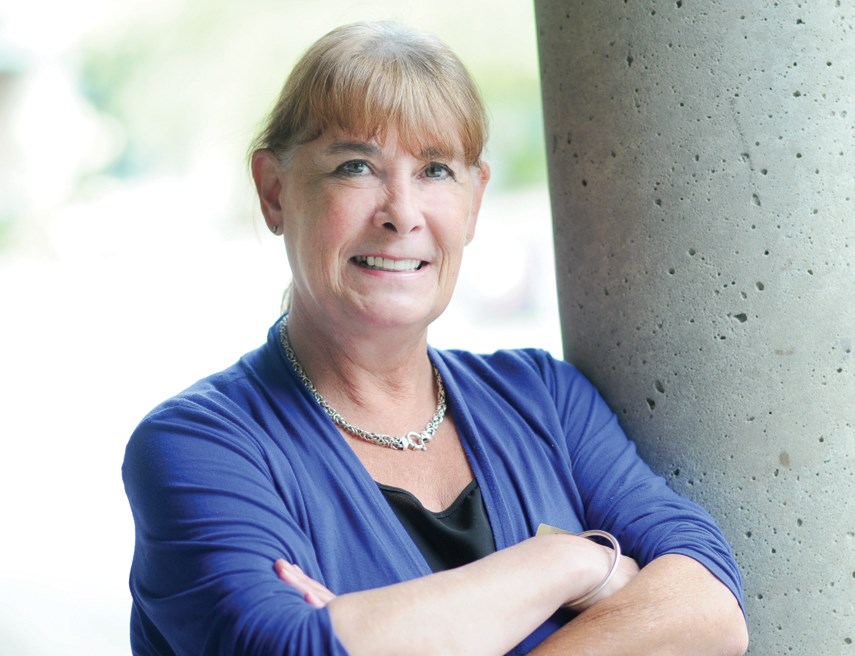Call him Alfred.
Every night, Alfred sat up in his room, long after lights out, hunting and pecking at an enormous black typewriter. Whatever he was trying to accomplish, it wasn’t working. Alfred was losing sleep and so were the residents and staff in the residential care facility that was now his home. Alfred was a problem and the solution to such problems, 40 years ago, was sedation.
Enter Pam Havens, all of 15 years old. Born and raised in the same small town where Alfred lived, Pam was working at the local care home for the summer before she entered Grade 10.
“What are you doing, Alfred?” she asked.
“I have to tell my story.”
At home that evening, Pam spoke with her parents about Alfred and together they came up with a solution.
Back at the care home the next day, Pam gave Alfred one of her father’s dictaphones. “Push this button when you want to talk and this button when you want to stop. The machine will record your story and I will type it out every night.”
Pam gave Alfred a red pen, too, because every writer must have a red pen for editing purposes.
That night, everyone slept.
Each day when Pam came to work, she exchanged dictaphones with Alfred and gave him the next chapter of his story, transcribed.
Alfred’s story was about living through Auschwitz.
When his story was told, Alfred sat on his bed in his room, a sheaf of paper in his hands and tears in his eyes.
“Thank you,” he said.
“You’re welcome,” Pam returned.
As Alfred’s story emerged, Pam struggled to understand why medication was the prescribed solution for this man. The behaviour was the problem, not the person. How was Alfred identified by his behaviour? Why was he not treated with respect, not only for what he had endured but because he was a human being? Why was no one listening?
Stories like Alfred’s led Pam to a career in gerontology and her journey towards providing person-centred care for people living with dementia.
One of the early graduates of Simon Fraser University’s gerontology diploma program, Pam worked as support and education co-ordinator for the Alzheimer Society of B.C. and went on to provide geropsychiatric education for the provincial health authorities.
And then, last fall, some 40 years after meeting Alfred and others like him, Pam joined My Parkgate Break, the dementia respite program at Parkgate Community Centre.
“Dementia sufferers push us to treat them as people. I love them for this,” says Pam. “They are always communicating as best they can. It’s our job to understand and to help. In Alfred’s case, publishing his story wasn’t the point, nor was it necessary that people hear his story. It was about understanding that Alfred was communicating his need to tell his story, and then helping him do so.”
Currently in our communities, most care for people with early to moderate dementia, that is, able to function in daily life, is taken on by spouses and adult children. These caregivers are aging too.
My Parkgate Break serves a great, and growing, need for people with dementia and for those who care for them. The program offers true respite: a block of time, twice weekly, so that caregivers have time to themselves, confident that their loved ones are safe, active and participating in daily life.
“At My Parkgate Break, we’re listening,” says Pam. “Our words are empowerment, independence, respect and dignity. Everything we do is about helping people make their own choices. Here they have freedom to feel, and to express their feelings. And we do this out in the community, where we’re interacting and engaging with people of all ages.”
Expanding person-centred dementia care across the North Shore will succeed through the participation of people with dementia and their caregivers, and by collaboration with local community organizations. Capilano Community Services Society is developing a program modeled on My Parkgate Break for the new Lions Gate community centre opening in 2020.
West Vancouver Seniors’ Activity Centre is adding an Alzheimer’s Cafe to its Keeping Connected dementia services roster.
Pam Havens and people from all three organizations will be at the North Shore Seniors’ Health Expo on Sept. 6.
They will join family caregivers Dr. David Kirkpatrick, John Jarvis and Sheryl Rasmussen who will share their experiences with loved ones on the dementia journey at a presentation called Faces of Care.
The Bus Stop, a short film about a family dealing with dementia, is on the program, too.
The Faces of Care presentation is slated for Friday at 1 p.m. in the Activity Room at West Vancouver Seniors’ Activity Centre.
Laura Anderson works with and for seniors on the North Shore. Contact her by phone at 778-279-2275 or email her at [email protected].



